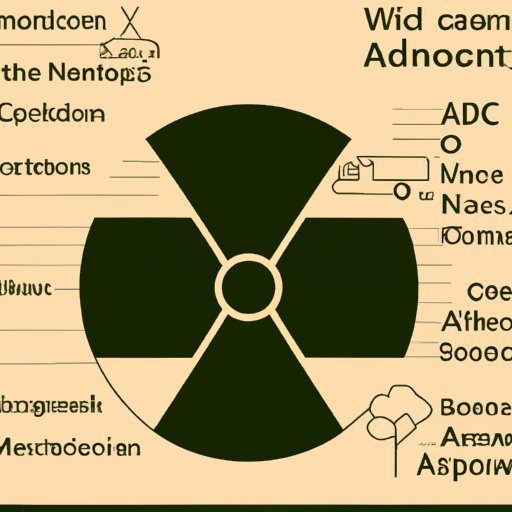Introduction
Artificial intelligence (AI) and nuclear weapons are two of the most powerful forces shaping the modern world. As technologies continue to evolve, so too do the risks associated with them. While the dangers of nuclear weapons have long been understood, the implications of AI are only beginning to be explored. This article will examine the potential dangers of AI compared to nuclear weapons, and explore how AI has been used historically in nuclear deterrence.

Examining the Impact of AI on Global Security
AI technology has already had a significant impact on global security, from military operations to cyber warfare. The use of AI in conflict situations presents both risks and benefits. On one hand, it can provide enhanced situational awareness, allowing for more effective decision-making and faster response times. On the other hand, it can lead to increased autonomy, potentially resulting in unintended consequences or human errors.
In terms of risk, AI can be used to create autonomous weapons systems, which could enable states to wage war without human intervention. This could lead to an arms race, as countries compete to develop ever more sophisticated weapons systems. In addition, AI-enabled cyber attacks could be used to disrupt critical infrastructure or access sensitive data, potentially leading to serious economic and political instability.
However, despite these risks, AI can also be used to reduce the risk of nuclear conflict. By providing better intelligence gathering capabilities, AI can help prevent miscalculations that could lead to armed conflict. It can also be used to detect and respond to nuclear threats more quickly, helping to avoid escalation.

Comparing the Costs and Benefits of AI and Nuclear Weapons
When considering the costs and benefits of AI and nuclear weapons, it is important to consider the economic, social and political impacts of both. In terms of economic impacts, the development and deployment of AI technology can be costly. However, the use of nuclear weapons can also have a significant economic impact, such as the cost of clean-up and containment after a nuclear accident or attack. In terms of social impacts, the use of AI can lead to job displacement, while the use of nuclear weapons can cause widespread death and destruction.
Politically, the use of AI can lead to increased surveillance and control, while the use of nuclear weapons can destabilize entire regions. It is also important to consider the long-term effects of both. The use of AI can lead to increased reliance on technology, while the use of nuclear weapons can lead to long-lasting environmental contamination and psychological trauma.

A Historical Overview of the Relationship Between AI and Nuclear Weapons
The relationship between AI and nuclear weapons stretches back to World War II, when the use of computers was first employed for military purposes. Since then, AI has been used in a variety of ways in nuclear deterrence, from early warning systems to automated weapons systems. With the development of more advanced AI technologies, such as machine learning and deep learning, this trend is likely to continue.
AI is also being used in nuclear non-proliferation efforts, such as monitoring nuclear facilities and detecting suspicious activity. The use of AI in these areas is seen as especially important given the complexity of nuclear weapons and the difficulty of detecting illicit activities. AI is also being used to identify and track nuclear materials, as well as to detect and respond to nuclear threats.
Understanding the Role of AI in Deterring Nuclear War
Despite its potential benefits, the use of AI in nuclear deterrence is not without its drawbacks. AI systems can be susceptible to manipulation or hacking, leaving them vulnerable to malicious actors. Additionally, AI systems can be difficult to regulate, raising concerns about accountability and oversight. Finally, AI systems may not be able to adequately account for human behavior, making them less reliable in predicting potential conflicts.
Despite these limitations, AI can still play a valuable role in nuclear deterrence. By providing enhanced situational awareness and improved decision-making capabilities, AI can help reduce the risk of nuclear accidents and miscalculations. AI can also be used to detect and respond to potential threats more quickly, helping to avoid escalation. Finally, AI can be used to monitor nuclear facilities and detect suspicious activity, helping to prevent proliferation.
Conclusion
In conclusion, AI has the potential to be both a blessing and a curse when it comes to global security. While the use of AI in conflict situations can present risks, it can also be used to reduce the risk of nuclear conflict. From early warning systems to automated weapons systems, AI has been used in nuclear deterrence since World War II. Despite its limitations, AI can still play a valuable role in nuclear deterrence, providing enhanced situational awareness and improved decision-making capabilities.
Overall, it is clear that AI is not necessarily more dangerous than nuclear weapons. Rather, both technologies can be used for good or bad, depending on how they are deployed. Ultimately, it is up to governments and citizens alike to ensure that these powerful technologies are used responsibly, for the benefit of all.
(Note: Is this article not meeting your expectations? Do you have knowledge or insights to share? Unlock new opportunities and expand your reach by joining our authors team. Click Registration to join us and share your expertise with our readers.)
